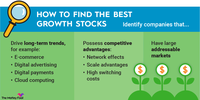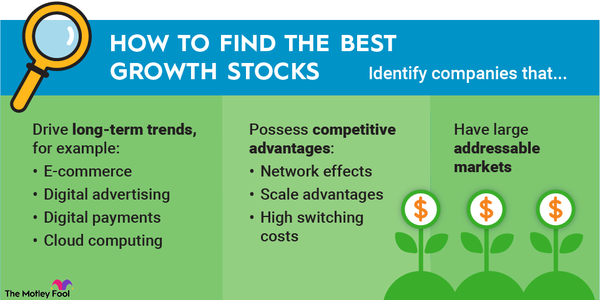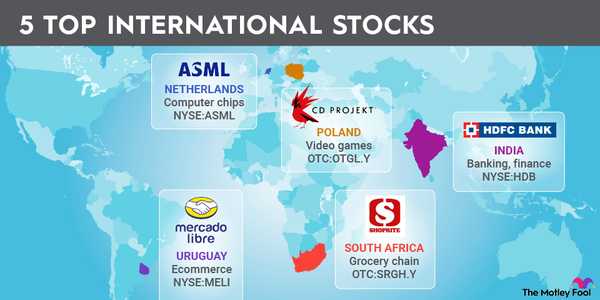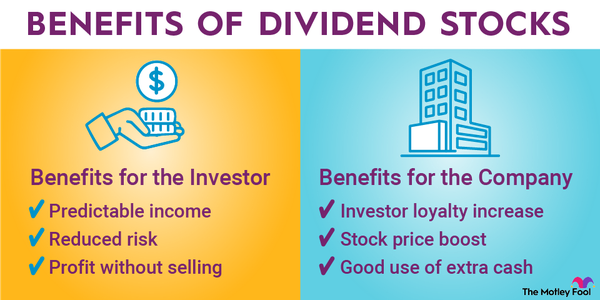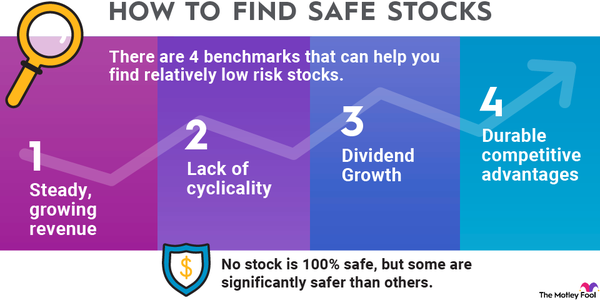
The economy moves in a cycle with four basic stages:
- Expansion: A period of sustained growth.
- Peak: A time of slowing growth.
- Contraction: A period of economic decline, also called a recession.
- Trough: A transitional time when the economy stops declining and begins to recover.
This cycle can have a significant impact on industries tied to economic growth. Stocks in those sectors tend to be very cyclical. Corporate profits typically rise during an expansion and contract during a recession, taking the price of cyclical stocks with them. This cyclicality contrasts with other types of stocks that tend to generate steady profits in good times or bad, making them relatively recession-proof.
The economy seemed to be transitioning from the expansion phase of the cycle to a peak stage in 2022. The Federal Reserve started raising interest rates to tame inflation as the world started getting back to normal with the pandemic subsiding. It’s not yet clear if the interest rate hikes will cause a recession or if the economy can get back to growth mode with a lower inflation rate. However, the uncertainty has caused a lot of volatility in cyclical stocks.
Here’s what you should know about investing in cyclical stocks.
What is a cyclical stock?
A cyclical stock is one whose underlying business generally follows the economic cycle of expansion and recession. Cyclical businesses perform well during economic expansions but typically experience significantly declining sales and profits during recessions and other challenging economic times.
Cyclical stocks tend to move up and down in value alongside the market.
Best cyclical stocks to buy in 2024
While the economy was expanding in 2021, it seemed to be nearing a cyclical peak in 2022 when the Federal Reserve started raising interest rates to curb inflation. That has started to affect cyclical stocks.
However, some cyclical stocks have longer-term tailwinds that should enable them to thrive even if economic headwinds grow stronger. With that in mind, here are four top cyclical stocks that should still thrive in the coming year:
1. The Walt Disney Company
Entertainment giant Disney (DIS -0.04%) has some cyclicality to its business. Consumers reduce their spending on discretionary purchases such as vacations during a recession. That affects Disney’s parks and other consumer businesses.
However, Disney is seeing resilient park demand in 2022 despite concerns about the economy. Demand for experiences has remained strong coming out of the early stages of the pandemic, benefiting Disney’s parks and movie businesses. Meanwhile, another entertainment offering, Disney+, continues to add subscribers as more people switch to streaming. Because of that, Disney could buck the economic cycle by continuing to boost its revenue and earnings in 2022.
2. Expedia
Expedia (EXPE -0.4%) operates several travel websites. The company is highly dependent on economic growth. When the economy slows -- as it did during the pandemic -- fewer people book trips using Expedia’s websites.
However, with almost all pandemic-related restrictions lifted, more people are traveling these days, especially those with the added flexibility of working remotely. This travel tailwind should continue to benefit Expedia in 2022 even if the economy slows.
3. EPR Properties
EPR Properties (EPR -0.32%) is a real estate investment trust (REIT) focused on owning experiential real estate such as movie theaters, ski resorts, eat-and-play locations, and other attractions. Demand for these experiences tends to decline during a recession. However, it’s holding up in 2022 because people still want to enjoy these experiences after having to hold back during the early stages of the pandemic.
Meanwhile, with demand strong, EPR Properties has returned to growth mode in 2022. The REIT has started acquiring experiential real estate again, which should enable it to increase its funds from operations (a metric measuring a REIT’s cash flow) and its monthly dividend.
4. Nucor
Steel producer Nucor (NUE -0.26%) tends to be highly cyclical since demand for steel ebbs and flows with the economy. When the economy is expanding, companies use more steel to construct buildings, cars, and other industrial goods. However, demand for steel tends to decline during a recession.
While Nucor could eventually see a slowdown in steel demand, it’s benefiting from an increase in infrastructure spending. Congress passed a large infrastructure bill in 2021 that should drive demand for steel over the next decade. That should benefit Nucor’s stock in 2022 and beyond.
Examples of cyclical industries
It’s not practical to list every cyclical industry. However, to give you a good idea of some of the sectors prone to cyclicality, here are eight prominent and easy-to-understand examples:
- Airlines: During good economic times, individuals and businesses tend to be more willing and able to spend money on airline tickets than during lean periods.
- Hotels: Like airlines, hotels depend on individuals and businesses spending money on travel.
- Retail: During economic contractions, people tend to spend less on discretionary retail goods. However, retailers primarily selling things that people need are not as cyclical, especially when they prioritize offering discounts. Walmart (WMT -0.08%) can be considered countercyclical since the company’s sales often increase during tough times.
- Restaurants: During economic downturns, people eat at home more often than they do during prosperous times, and restaurant stocks often suffer as a result.
- Automakers: Consumers tend to hang on to their vehicles longer when recessions hit and are more inclined to buy new vehicles in prosperous times, so automaker stocks tend to be quite cyclical.
- Technology: Most (but not all) tech stocks are cyclical. Individuals and businesses are less inclined to spend money on the latest technologies and electronic devices during recessions.
- Banks: Bank stocks are cyclical. In a recession, the profitability of banks often declines. Recessions reduce demand for banking products, including mortgages, auto loans, and credit cards, and more consumers who already have loans struggle to pay their debts. In addition, interest rates usually fall during recessions, causing bank profit margins to contract.
- Manufacturing: In tough times, companies that manufacture physical products generally experience plunging demand as individuals and businesses spend less on pretty much everything.
Many of the sectors mentioned above, such as automotive and retail, are consumer-facing industries and therefore part of the consumer cyclicals sector. Consumer cyclicals are consumer discretionary goods that, unlike consumer staples, aren’t strictly necessary purchases.
Consumer cyclicals are divided into two subcategories: durable and non-durable. Durable cyclicals include physical consumer goods that have long useful lives (e.g., vehicles). Non-durable cyclicals have shorter useful lives or are consumed quickly (e.g., clothing and prepared foods).
Each recession is different. An economic downturn might not affect all cyclical stocks the same way. For example, although the travel and leisure industries tend to be cyclical, they might not experience a decline if there is a recession in 2022 or 2023 because they’re still bouncing back from the early stages of the pandemic.
Examples of non-cyclical industries
Some types of businesses aren’t affected much by economic cycles. The stocks of these companies are non-cyclical and are known as defensive stocks or recession-proof investments. They tend to perform similarly during both economic contractions and expansions.
Here are a few of the most prominent non-cyclical industries:
- Non-discretionary retail are companies selling things that people need, and they tend to be rather resilient in nature. In addition to big-box retailers such as Walmart, drugstores and grocery stores fit into this category.
- Utilities stocks tend to be highly defensive since consumers (for the most part) continue to pay their electric and water bills even during the deepest recessions.
- Real estate is another sector that can be considered defensive, although the degree of defensiveness of a stock depends on the nature of the company’s properties. For example, REITs that focus on necessity retail or medical office buildings usually perform better in difficult economies than those that invest in hotels.
That said, the nature of a recession or downturn can have surprising effects on normally defensive holdings. For example, a severe recession can weigh on even the most defensive stocks as investors pivot to even lower-risk investments such as bonds or cash until the dust settles.
Examples of cyclical and defensive stocks
To give you some concrete ideas of the types of stocks we’re talking about, here are some common cyclical and defensive stocks:
Cyclical stocks
- JPMorgan Chase (JPM 0.06%)
- Apple (AAPL -0.35%)
- General Motors (GM 0.48%)
- Boeing (BA 0.25%)
- Texas Roadhouse (TXRH 0.38%)
Defensive stocks
- Dominion Energy (D -1.02%)
- Costco (COST 1.01%)
- Equity Residential (EQR 0.4%)
- General Mills (GIS -0.77%)
- Coca-Cola (KO 0.0%)
To be clear, none of the companies on these lists are perfectly cyclical or perfectly defensive. Depending on the circumstances of a specific recession, some of the cyclical names could do relatively well. Meanwhile, the defensive stocks could see profits significantly decline. However, these are still good examples of stocks that generally behave either cyclically or defensively.
Related investing topics
When should you buy cyclical stocks?
In a perfect world, the best investment strategy would be to buy cyclical stocks at the start of an economic expansion and to sell them just before a recession. But trying to predict the timing of a future recession or expansion is a losing battle.
It's smarter to own a combination of both cyclical and defensive stocks in your portfolio. You’ll be well-positioned to prosper when the economy is growing but also will have some downside protection when the economy contracts.


